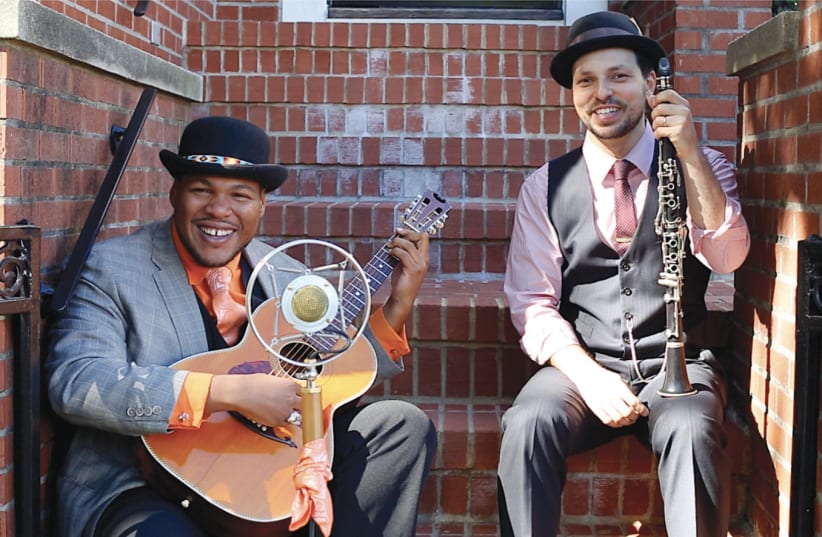Dennis Lichtman is used to keeping several balls in the air at the same time, literally.
In a YouTube clip of a picturesquely named number called “String-Pickin’ Fiddle-Bowin’ Horn-Blowin’ Fool,” Lichtman flits between a seemingly inexhaustible instrumental catalog that takes in a fiddle, clarinet, guitar, mandolin, banjo and saxophone. He caps that lot off with, yes, a spot of actual juggling.
“Yeah, I do a lot of things,” Lichtman laughs. “I keep busy.”
He got the idea for the fun video, particularly the instrumental switch flow, from one of the titans of American roots music. “It was inspired by a video with a great old rockabilly guitar and fiddle and kind of everything player called Joe Maphis. He was a country and rockabilly legend. He had a song called ‘Pickin’ and Singin’. He sings a quick verse and then plays the hell out of a guitar, and then sings another verse and then plays a banjo, then mandolin and then slaps the heck out of a bass.”
The Maphis slot makes for smile-inducing thigh-slapping viewing, and Lichtman’s version is a creditable contemporary reprise.
Some of the aforementioned means of music making will feature in his impending tour of the country, along with another scintillating multi-instrumentalist, Jerron “Blind Boy” Paxton, under the aegis of the Hot Jazz series.
The two artists, who have a definite penchant for sunny early jazz vibes, open at the Jerusalem Theater on November 8 (9 p.m.), with five more gigs lined up for Herzliya, Kfar Saba, Tel Aviv and Haifa through to November 13.
In fact, if you’re looking to get some idea of Lichtman’s musical spread, the YouTube video provides a delightful narration of his instrumental evolution, delivered in a most entertaining style. All of which augurs well for the Hot Jazz series patrons.
As faithfuls of the long-running Jacob’s Ladder Festival can attest, Paxton also delivers the goods, and gets his audiences fully engaged and on board with his silky musicianship and irresistible joie de vivre.
Lichtman comes across as a similarly cheerful character. It was that desire to smile while he plays, and dispense joy to all and sundry, that pointed him in the direction of the insouciant sounds of early jazz.
“I’ve wondered about that so much myself,” Lichtman confesses.
HE STRUCK out on his musical road at a tender age and in definitively serious climes.
“I started with classical lessons on violin, when I was five, and then soon after that classical clarinet lessons,” he recalls.
Given his domestic background, that was perfectly natural.
“My mother listened a lot to classical music in the house, so I was always around melody. I played melody instruments when I was little, and I was always drawn to melody. When I heard classical music in the house, it was always the melodies that stood out to me.”
Then again, that didn’t mean the youngster was going to stick to Beethoven, Mozart et al. “As time went on, I became more and more drawn to other styles of music – you know, rock and all sorts of things. In high school I got an electric guitar, and I went down that path for a while.”
It is hard to think of a musical domain that is much further from his current vehicle of sonic expression, but back then the youngster was into some decibel-pumping stuff. “I loved Jimi Hendrix. He was my absolute favorite for years.”
Lichtman is clearly adept at going with the flow and changing course, and not looking back, when an epiphanous moment comes along.
He became enchanted with some American roots music.
“I discovered bluegrass and started going to bluegrass festivals,” he notes, adding that he was also attracted by the rawness and elemental nature of the genre, and the hands-on side of things, as well as the sense of camaraderie. “There is a very communal aspect at bluegrass festivals where, all day long, you could listen to these great legendary musicians perform on stage, and then all night long at the campsites you play tunes and jam, and hang out and play music communally.”
Despite his childhood classical training, Lichtman was still a greenhorn in bluegrass pursuits, but was wooed by the genre’s beginner user-friendliness. “The structure of that music is simplistic. It’s an offshoot of country music. The chord structures are simplistic. If you know how to play three chords, you can join in.”
Still, the lad had some way to go before he could mix it with the pros. “It takes a lifetime to master and, of course, to write great songs and pour emotion into your performance, but the barrier to entry is very low.”
Since those far-flung wide-eyed days, Lichtman has broadened his toolbox and honed his playing skills appreciably. The seeds for his musical career were well and truly sown back then, as he seamlessly and joyously slipped into a very different fraternity and feel. “I started playing music in very social communal ways that were completely different from classical, which is much more rigid and structured, not just in the musical form but also in terms of how it’s rehearsed and performed.”
Lichtman was ready and primed to let his hair down, and he has been following that merry avenue ever since. “The more I got into that kind of rootsy acoustic music, the more I became drawn to other styles of music that had those same things in common.”
THE LICHTMAN-PAXTON sets here will feed off all those sentiments, as well as doffing their headgear to some of the leading lights of America’s musical backdrop.
In his Just Cross The River album, which he put together in 2016, Lichtman saluted some of the unsung heroes who relocated to his current New York City backyard in years gone by.
“I wrote original, mostly swing-style tunes that were inspired by stories of jazz legends who had migrated to the unglamorous borough of Queens. Which is where Jerron and I both live,” he laughs.
Lichtman may have been initially attracted by the accessibility of the music, but he dug down into the deepest seams of the history before embarking on the project. He enlisted the help of an illustrious maven of the field.
“I called Vince Giordano,” he says, referencing Grammy Award-winning saxophonist and leader of the New York-based Nighthawks Orchestra which specializes in the hot jazz and dance styles of the 1920s and 1930s.
“Vince is an encyclopedia of any published music from that whole era,” says Lichtman. “I asked him if he knew of any published music from before about 1950 that had any reference to Queens.”
There were extremely thin pickings to be had.
“He went through his database of 50,000 songs, and he found one,” Lichtman chuckles.
That song, from 1927, which Lichtman describes “as not very great and goofy,” went by the name of “Just Cross the River from Queens.” Hence the name of the Lichtman album.
Possibly the most venerated jazzman of all, who lived in Queens, was a certain Louis “Satchmo” Armstrong, and Lichtman and Paxton paid tribute to the great trumpeter-vocalist by playing the number on the steps of Armstrong’s former residence, the Louis Armstrong House Museum on 107th Street.
The spirit of the pioneering late Queens resident and other envelope pushers of their day will no doubt wow the Hot Jazz series audiences this week, presented with a beguiling blend of sizzling instrumental skills and unapologetic bonhomie.
For tickets and more information: (03) 573-3001 and http://eng.hotjazz.co.il

